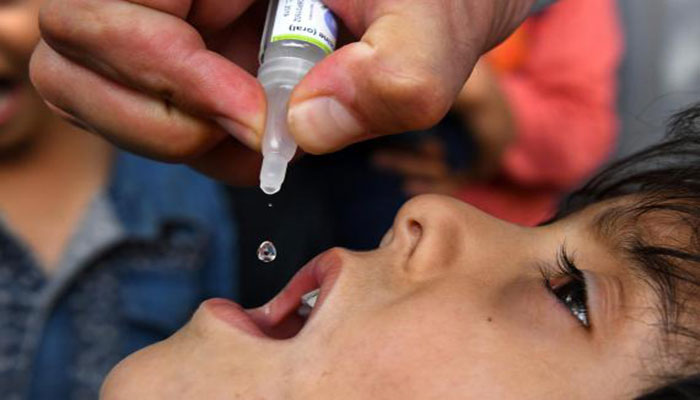Poliovirus circulation in Afghanistan a threat to world, says top UNICEF official
PESHAWAR: The chief of immunisation for UNICEF in Afghanistan, Mohammed Mohammedi, has expressed concern that the poliovirus circulation in the country will continue to pose a serious threat not only to Afghan children, but to the rest of the world as well.
The increase in the number of polio cases, particularly in the southern provinces, necessitates a more integrated approach to service delivery and a greater participation by the Taliban in the policy-making process and implementation of the vaccination programme.
Africa was declared free of wild poliovirus in August 2020. The virus remains endemic in just two countries, Pakistan and Afghanistan. Polio vaccination campaigns in Afghanistan were halted in March 2020 for several months as the country went into lockdown due to the coronavirus pandemic. The vaccination resumed in August 2020.
Afghanistan reported 56 polio cases of WPV1 in 2020 compared to 29 in 2019 and 21 in 2018. In 2019 and 2020, 70 percent of all the polio cases were reported from the southern provinces of Helmand, Kandahar and Uruzgan.
At epidemiologic week 47 of 2020, Helmand reported 16 polio cases, Kandahar 14 and Uruzgan four. This represents 60 percent of the total cases reported in the war-torn country.
Talking to The News from Kabul on phone, Mohammedi mentioned a number of reasons for the continued circulation of the wild poliovirus in Afghanistan. In his view, the demands and requests of the communities have been neglected for too long contributing to the delay in polio eradication efforts. He noted that corruption, poor management of the polio programme and interference in the selection of programme staff have also stood in the way of eradicating the crippling disease once and for all.
-
 Patriots' WAGs Slam Cardi B Amid Plans For Super Bowl Party: She Is 'attention-seeker'
Patriots' WAGs Slam Cardi B Amid Plans For Super Bowl Party: She Is 'attention-seeker' -
 Martha Stewart On Surviving Rigorous Times Amid Upcoming Memoir Release
Martha Stewart On Surviving Rigorous Times Amid Upcoming Memoir Release -
 Prince Harry Seen As Crucial To Monarchy’s Future Amid Andrew, Fergie Scandal
Prince Harry Seen As Crucial To Monarchy’s Future Amid Andrew, Fergie Scandal -
 Chris Robinson Spills The Beans On His, Kate Hudson's Son's Career Ambitions
Chris Robinson Spills The Beans On His, Kate Hudson's Son's Career Ambitions -
 18-month Old On Life-saving Medication Returned To ICE Detention
18-month Old On Life-saving Medication Returned To ICE Detention -
 Major Hollywood Stars Descend On 2026 Super Bowl's Exclusive Party
Major Hollywood Stars Descend On 2026 Super Bowl's Exclusive Party -
 Cardi B Says THIS About Bad Bunny's Grammy Statement
Cardi B Says THIS About Bad Bunny's Grammy Statement -
 Sarah Ferguson's Silence A 'weakness Or Strategy'
Sarah Ferguson's Silence A 'weakness Or Strategy' -
 Garrett Morris Raves About His '2 Broke Girls' Co-star Jennifer Coolidge
Garrett Morris Raves About His '2 Broke Girls' Co-star Jennifer Coolidge -
 Winter Olympics 2026: When & Where To Watch The Iconic Ice Dance ?
Winter Olympics 2026: When & Where To Watch The Iconic Ice Dance ? -
 Melissa Joan Hart Reflects On Social Challenges As A Child Actor
Melissa Joan Hart Reflects On Social Challenges As A Child Actor -
 'Gossip Girl' Star Reveals Why She'll Never Return To Acting
'Gossip Girl' Star Reveals Why She'll Never Return To Acting -
 Chicago Child, 8, Dead After 'months Of Abuse, Starvation', Two Arrested
Chicago Child, 8, Dead After 'months Of Abuse, Starvation', Two Arrested -
 Travis Kelce's True Feelings About Taylor Swift's Pal Ryan Reynolds Revealed
Travis Kelce's True Feelings About Taylor Swift's Pal Ryan Reynolds Revealed -
 Michael Keaton Recalls Working With Catherine O'Hara In 'Beetlejuice'
Michael Keaton Recalls Working With Catherine O'Hara In 'Beetlejuice' -
 King Charles, Princess Anne, Prince Edward Still Shield Andrew From Police
King Charles, Princess Anne, Prince Edward Still Shield Andrew From Police




